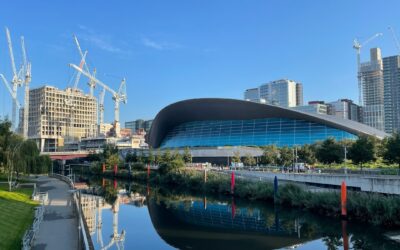Swedish representation in UK Heat Networks expert group • SHC at European Sustainable Energy week in Brussels • Vattenfall Heat UK starts construction of Heat Network in Scotland • Read more about the developments in sustainable heating and cooling in this month's news update from the UK

The UK government sees Heat Networks as a key part of its energy strategy to reach net zero emissions by 2050. The influential Climate Change Committee, which reports to the government, has recently recommended that around 18% of UK heat should come from heat networks by 2050. At present they provide 2-3%.
With heat network installations across the UK now developing steadily, the government is encouraging continued growth with financial support and a new regulatory regime that will put heat networks on a similar regulatory footing as gas and electricity. Up to now, regulations around heat networks have been put in place by industry players on a voluntary basis. And although most market participants have adhered to the rules, some issues of non-compliance have been raised.
In line with the UK government’s commitment to raise standards, a Heat Networks Technical Assurance Scheme (HNTAS) is being established to ensure a minimum level of performance and reliability for heat networks, leading to good consumer outcomes. HNTAS will feed into Ofgem, the UK’s energy regulator. Work has now begun to determine the necessary governance structures, technical specifications and procedures that will be required to meet the aims for the scheme. Good progress has already been made to design and develop a scheme that will provide credible assurance of heat network quality and performance and ensuring compliance with technical standards.
Christer Frennfelt, Business Development Manager, Consultant and Utility for SWEP, has been appointed (in a personal capacity) to one of the key HNTAS technical groups, which is focusing on topics related to substations.
Christer says “For the past eight years I have been involved in helping to develop the UK’s neat networks industry and over that time have seen a lot of progress. But there is no doubt that the industry needs to be put under proper regulatory control. HNTAS will help to achieve this, and I will be delighted to play a part, having been invited to join this influential working group.”
Christer is a Chartered Engineer through his membership of the Chartered Institution of Building Services Engineers (CIBSE).
On the 22 June 2023, at the EUSEW Policy Conference, held in Brussels, the Swedish Energy Agency and Business Sweden co-hosted a session, focusing on efforts of Sweden, the UK, France, and Bulgaria in driving the energy transition through carbon-neutral heating. The session brought together governmental representatives, heat network operators, and industry experts and representatives, shedding light on innovative approaches to sustainable heating and cooling solutions.
Heating accounts for a significant share of European emissions, making the transition away from fossil-based heating sources crucial in achieving the EU’s climate targets. The session explored various key aspects of sustainable heating policies and technologies, and their potential in reducing emissions. Speakers from Stockholm Exergi, Compagnie de Chauffage, Toplofikacia Sofia E.A.D., Alfa Laval, Siemens Energy, and Bulgaria’s Ministry of Energy shared their insights and experiences, highlighting the successful implementation of sustainable heating solutions.
The session featured the decarbonisation journeys of three European cities (Grenoble, Sofia, and Stockholm) – showcasing their innovative approaches to carbon-neutral heating. Through the case studies, attendees gained valuable insights into large-scale implementation strategies for sustainable heating solutions across the Europe.
With the urgent need to address climate change, the session emphasised the importance of sustainable heating technologies and their role in achieving EU climate targets. By showcasing successful initiatives and sharing best practices, the session also provided a platform for collaboration and knowledge exchange among industry experts, policymakers, and other relevant stakeholders.
The participation at EUSEW Policy conference is part of the “Sustainable Heating & Cooling by Sweden”-program to promote collaboration, facilitate knowledge-sharing and accelerate the development & implementation of sustainable heating and cooling solutions around Europe and across the world.
Read more in the LinkedIn post from Business Sweden
The recording of the full session is available here
The construction of Shawfair Town in Midlothian is underway, and an exciting milestone has been achieved with the installation of the first pipes for a low-carbon heating system. Vattenfall Heat UK, in collaboration with Midlothian Council under the Joint Venture known as Midlothian Energy Limited, aims to provide around 3,000 homes, education, and retail properties in Shawfair Town with sustainable heating. This project marks Vattenfall’s first-ever heat venture in Scotland and is a flagship project for Midlothian Energy Limited.
The system captures waste heat from the Millerhill recycling and energy recovery centre (RERC), operated by FCC Environment. By utilizing this system, the project is expected to reduce emissions by up to 90% compared to individual gas boilers. The shift away from fossil fuels not only supports environmental goals but also protects consumers from volatile energy bills.
The initial phase of the heating network involves the installation of approximately four kilometres of pipes and is estimated to save over 2,500 tonnes of CO2 annually, equivalent to removing 1,200 cars from the road. Furthermore, the project has received £7.3 million in funding from the Scottish Government’s Low Carbon Infrastructure Transformation Project (LCITP). This is the first step of Midlothian Energy Limited’s five-year business plan to provide low-carbon heat to over 30,000 households.
Read more in article from Midlothian View
Read more in article from Power Engineering International
To stay updated on news for sustainable heating and cooling, follow us on Twitter and LinkedIn, and subscribe to our Newsletter.
Sweden is at the forefront of decentralised heat networks technology. Our aim for “Sustainable Heating & Cooling by Sweden” is to facilitate knowledge sharing between British, French and Swedish stakeholders and develop and encourage environmental and economic best practice.
To find out how we can help you and your organisation, please contact our London or Paris-based “SHC” teams. We can introduce you to leading consultants, suppliers of technology and services who will be pleased to share know-how of the development of sustainable heating & cooling solutions.


